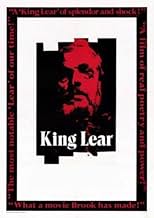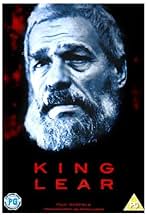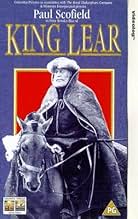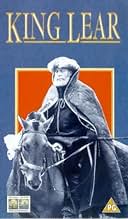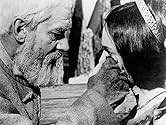Füge eine Handlung in deiner Sprache hinzuKing Lear divides his kingdom among his daughters, giving great importance to their protestations of love for him. When Cordelia refuses to idly flatter the old man, he banishes her and turn... Alles lesenKing Lear divides his kingdom among his daughters, giving great importance to their protestations of love for him. When Cordelia refuses to idly flatter the old man, he banishes her and turns for support to his remaining daughters.King Lear divides his kingdom among his daughters, giving great importance to their protestations of love for him. When Cordelia refuses to idly flatter the old man, he banishes her and turns for support to his remaining daughters.
- Regie
- Drehbuch
- Hauptbesetzung
- Auszeichnungen
- 2 Gewinne & 1 Nominierung insgesamt
Empfohlene Bewertungen
I have read altogether too many reviews of this film which bash it all to hell because the reviewer doesn't agree with Brook's reading of KING LEAR. To all such folk I would like to say: We Shakespeare fans should positively glory in the fact that every reader (and a fortiori every director) has his or her own interpretation of all the plays. Given Brook's interpretation, the film is wonderful.
This version of Shakespeare's greatest tragedy is not only consistent with itself, which most aren't, it is acted to a hilt. The characters are brilliantly portrayed. The interactions between them appear as the absolute and utter epitome of conflict and love, of the heroic and villainous way people act when confronted with a situation that is calculated to freak a human being out.
My favorite characterization is that of the Fool, who utterly steals the show and who becomes almost a Greek chorus. The way he interacts with Lear suggests a metaphysical mood of "We know exactly what's going on here, don't we?" The understanding between these two is too deep to be expressed in normal language; in the conversation around "The reason why the seven stars are only seven" (which would have struck any of the other characters, except maybe Kent, as a demented sequence of non sequiturs) suggests that Lear knows, at least at that moment, how the story will turn out, and that his attitude is one of "what is't to leave betimes? Let be." The Fool is here a prophet of absurdity, a Dark Age cross between a Marx Brother and Lenny Bruce.
And I challenge anyone to show me any actors who could do Kent and Gloucester better than those who portrayed them in this film. To say nothing of the wonderful job Scofield does with the title role.
Brook's Lear is almost sociopathically unfeeling until disaster begins to overtake him. To be sure, this view of Lear is not mine. But again, Shakespeare's characters are topics inexhaustible, and there is no such thing as a Lear to end all Lears. Whether one agrees with Brook or not, he carries his idiosyncratic reading off brilliantly---just as brilliantly as Laurence Olivier and Ian Holm in their utterly un-Brookish TV versions. I say: Let it ride! Let's have as many defensible and indefensible Lears as possible, and let's have them as utterly contradictory of each other as the 1945 and 1991 film versions of Henry the Fifth are.
By the way, I am a recent convert to this position. Before I saw the light, I was (for example) utterly ticked off at Kenneth Branagh's film of HAMLET, because it portrayed the Prince as having had sex with Ophelia way back when, and because its Fortinbras was an uncultured creep who dissed Hamlet by tearing down his father's monument. Wasn't it obvious that the text utterly contradicts both notions? Yep! But Branagh would have every right to say to me, "The hell with you, go make your own film." And so would Brook to his critics.
See it, friend. I look forward to our friendly argument.
This version of Shakespeare's greatest tragedy is not only consistent with itself, which most aren't, it is acted to a hilt. The characters are brilliantly portrayed. The interactions between them appear as the absolute and utter epitome of conflict and love, of the heroic and villainous way people act when confronted with a situation that is calculated to freak a human being out.
My favorite characterization is that of the Fool, who utterly steals the show and who becomes almost a Greek chorus. The way he interacts with Lear suggests a metaphysical mood of "We know exactly what's going on here, don't we?" The understanding between these two is too deep to be expressed in normal language; in the conversation around "The reason why the seven stars are only seven" (which would have struck any of the other characters, except maybe Kent, as a demented sequence of non sequiturs) suggests that Lear knows, at least at that moment, how the story will turn out, and that his attitude is one of "what is't to leave betimes? Let be." The Fool is here a prophet of absurdity, a Dark Age cross between a Marx Brother and Lenny Bruce.
And I challenge anyone to show me any actors who could do Kent and Gloucester better than those who portrayed them in this film. To say nothing of the wonderful job Scofield does with the title role.
Brook's Lear is almost sociopathically unfeeling until disaster begins to overtake him. To be sure, this view of Lear is not mine. But again, Shakespeare's characters are topics inexhaustible, and there is no such thing as a Lear to end all Lears. Whether one agrees with Brook or not, he carries his idiosyncratic reading off brilliantly---just as brilliantly as Laurence Olivier and Ian Holm in their utterly un-Brookish TV versions. I say: Let it ride! Let's have as many defensible and indefensible Lears as possible, and let's have them as utterly contradictory of each other as the 1945 and 1991 film versions of Henry the Fifth are.
By the way, I am a recent convert to this position. Before I saw the light, I was (for example) utterly ticked off at Kenneth Branagh's film of HAMLET, because it portrayed the Prince as having had sex with Ophelia way back when, and because its Fortinbras was an uncultured creep who dissed Hamlet by tearing down his father's monument. Wasn't it obvious that the text utterly contradicts both notions? Yep! But Branagh would have every right to say to me, "The hell with you, go make your own film." And so would Brook to his critics.
See it, friend. I look forward to our friendly argument.
Peter Brook has the knack of making his stagings completely his own while at the same time enhancing the character of the play. Thus in "Carmen" he turns it into something of a chamber play, and here in King Lear he stresses the primitivism of the play turning into almost something like a documentary of the dark ages. In especially the first part including the storm he is entirely successful, in spite of the rather experimental expressionism,and the realism of the primitive middle age settings in a landscape of only moors and snows, not a tree in the whole film, is effectively impressing. The actors are superb throughout, and Paul Scofield renders a very interesting interpretation of the old man losing himself with occasional magnificent outbursts of powerful rage. The play is shortened, of course, you can't put all of a Shakespeare play into a film, (I believe the only successful attempt at that was Kenneth Branagh's "Hamlet" and very commendable as such,) while here the text abbreviations unfortunately suffer, the cuts being so obvious. Another flaw is that the articulation is not very good - it was fashionable in the end of the 60s to allow actors to talk on stage like as if they talked naturally, but theatre can't do without rhetoric; and especially with a language like this, which is the very essence of the play, you can't trifle with it, every word has to be pronounced distinctly, or it isn't Shakespeare.
Towards the end the direction gets more sloppy, the intensity loses its grip, while the apocalyptic battle scenes crown the direction. The austere scenery throughout I believe will be what you most will remember of this film adaptation, which couldn't be more impressive, while I think I would prefer the Russian version from about the same time as more convincingly Shakespearian. Since many years I have been waiting for an opportunity to see the Laurence Olivier version from 1983.
Towards the end the direction gets more sloppy, the intensity loses its grip, while the apocalyptic battle scenes crown the direction. The austere scenery throughout I believe will be what you most will remember of this film adaptation, which couldn't be more impressive, while I think I would prefer the Russian version from about the same time as more convincingly Shakespearian. Since many years I have been waiting for an opportunity to see the Laurence Olivier version from 1983.
As has happened so many times with the Oscars, another great film-actor-ensemble has been neglected. Recognised nearly universally as the ultimate test of an actor's craft, Paul Scofield as Lear in this 1971 version could be deified for his performance, even more complex than his Oscar-winning Thomas More in 1966's best pic "A Man For All Seasons". Viewing this film should be a prerequisite not just for R.A.D.A. acting students. Incorporating as he did the essence of Lear so organically, Scofield sadly was not even nominated, another nod to the lowest common denominator public taste. This review, nearly forty years after the pic's release, was an on-the-spot spontaneous impulse after yet another viewing of the film. People are afraid of Shakespeare(a.l.a. DeVere); don't be. All, but especially any pained by their own offspring, will turn away from the screen with much more than a penny's worth of thought and a rediscovery of the art of Paul Scofield and ensemble. It is a cliché, but they just don't make movies like this one anymore.
Protagonists for William Shakespeare's plays run the gamut of age. From teenagers Romeo&Juliet to the ancient King Lear. Shakespeare was an ardent
observer of mankind at all ages.
I've often wondered if Shakespeare got the germ of an idea for Lear when in his lifetime he saw Emperor Charles V who had a lot of Europe and a lot of the new world under his control. Politics of the time dictated he divide his empire and half went to his son who became Philip II of Spain and the other half went to brother Maximilian of Austria. Charles died in a monastery 2 years later.
It might have been better for Lear if he had locked himself up in a monastery and stayed there. But he was a tired old man and he had daughters instead of suns. Two daughters flatter the old guy and they get two halves of the kingdom. The third doesn't play that game and he cuts her off.
Then instead of staying in a monastery, the daughters and their husbands make it real clear to Lear that his advice and counsel aren't needed or wanted. Quite a shock coming from his 'faithless' children.
Peter Brook directed and also augmented Shakespeare's plot with some of his own ideas. More than Bard purists denounced the production, but as I remember they fit into the play structure nicely.
Brook also shot the film on the bleak and craggy shores of the Danish coastline. You can hardly tell this is a color film. But that also fit in well with the bleak and moody atmosphere of the play itself.
One undeniable asset this King Lear has is Paul Scofield in the title role. He is nothing short of superb in the title role and he underplays a lot more than either Laurence Olivier or Orson Welles in the same part. His closeups tell a great deal of the story.
This is not the best King Lear, but for Paul Scofield fans an absolute must.
I've often wondered if Shakespeare got the germ of an idea for Lear when in his lifetime he saw Emperor Charles V who had a lot of Europe and a lot of the new world under his control. Politics of the time dictated he divide his empire and half went to his son who became Philip II of Spain and the other half went to brother Maximilian of Austria. Charles died in a monastery 2 years later.
It might have been better for Lear if he had locked himself up in a monastery and stayed there. But he was a tired old man and he had daughters instead of suns. Two daughters flatter the old guy and they get two halves of the kingdom. The third doesn't play that game and he cuts her off.
Then instead of staying in a monastery, the daughters and their husbands make it real clear to Lear that his advice and counsel aren't needed or wanted. Quite a shock coming from his 'faithless' children.
Peter Brook directed and also augmented Shakespeare's plot with some of his own ideas. More than Bard purists denounced the production, but as I remember they fit into the play structure nicely.
Brook also shot the film on the bleak and craggy shores of the Danish coastline. You can hardly tell this is a color film. But that also fit in well with the bleak and moody atmosphere of the play itself.
One undeniable asset this King Lear has is Paul Scofield in the title role. He is nothing short of superb in the title role and he underplays a lot more than either Laurence Olivier or Orson Welles in the same part. His closeups tell a great deal of the story.
This is not the best King Lear, but for Paul Scofield fans an absolute must.
Much reviled at the time of it's release, this heavily cut, Danish
co-production horrified critics with it's bleak as possible take on what
some consider the world's greatest play.
Obviously influenced by nortic flicks from Dryer to Bergman,
Peter Brook shot this as a midevil horror show; and Pauline Kael called
it his "Night Of The Living Dead."
While certainly unfair to the scope of the Bard's vision, the
film is undeniably facinating; though sometimes tedious too. In the best
parts it comes alive with a vivid wickedness, you can certainly see how
Lear's daughter's came to hate his guts!
So, even if it does mutilate a classic, this film is pretty
amazing and highly recommendable. A dark product of it's own time, you
will scarcely see a Lear like this again.
co-production horrified critics with it's bleak as possible take on what
some consider the world's greatest play.
Obviously influenced by nortic flicks from Dryer to Bergman,
Peter Brook shot this as a midevil horror show; and Pauline Kael called
it his "Night Of The Living Dead."
While certainly unfair to the scope of the Bard's vision, the
film is undeniably facinating; though sometimes tedious too. In the best
parts it comes alive with a vivid wickedness, you can certainly see how
Lear's daughter's came to hate his guts!
So, even if it does mutilate a classic, this film is pretty
amazing and highly recommendable. A dark product of it's own time, you
will scarcely see a Lear like this again.
Wusstest du schon
- WissenswertesBrook based this production on ideas expressed by Polish theater critic Jan Kott in the book "Shakespeare, Our Contemporary".
- Crazy CreditsNot only is there no music in the film, but there are no "ambient sounds" at all during the opening credits, giving the impression that they were filmed using no soundtrack whatsoever.
- VerbindungenFeatured in William Shakespeare - Ein Genie und seine Zeit: Folge #1.3 (2023)
Top-Auswahl
Melde dich zum Bewerten an und greife auf die Watchlist für personalisierte Empfehlungen zu.
- How long is King Lear?Powered by Alexa
Details
- Erscheinungsdatum
- Herkunftsländer
- Offizieller Standort
- Sprache
- Auch bekannt als
- Kral Lear
- Drehorte
- Produktionsfirmen
- Weitere beteiligte Unternehmen bei IMDbPro anzeigen
- Laufzeit2 Stunden 17 Minuten
- Farbe
- Sound-Mix
- Seitenverhältnis
- 1.66 : 1
Zu dieser Seite beitragen
Bearbeitung vorschlagen oder fehlenden Inhalt hinzufügen


